
FEMISE and The Center for Mediterranean Integration (CMI) are organizing a webinar on “Navigating through COVID-19 in the Mediterranean“, on Tuesday 8th December 2020.
You can catch up on everything and consult the report below about the webinar and access all the authors’ presentations to learn more about the implications of COVID-19 on the Mediterranean and how the Med countries will pave their way out of the crisis.
You can also access the video link of the webinar on the FEMISE youTube Channel by clicking here
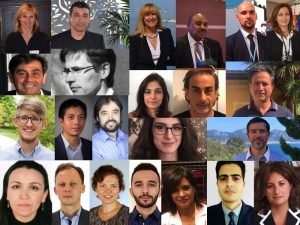
Navigating through COVID-19 in the Mediterranean
Act 1: Strategies for Integration and Resilience
December 8th 2020, 14:30-17:00
This webinar is the first product resulting from the recent CMI-FEMISE partnership, arriving at a crucial time when the EU-Med region has been struggling to overcome the devastating impacts of COVID-19. Three key issues were covered during the event: The first session covered the financial reform strategies and the role of digitalization, the second session addressed the environmental Policy Landscape in a Post-Covid World, and finally Country-Specific Implications were presented during the third session
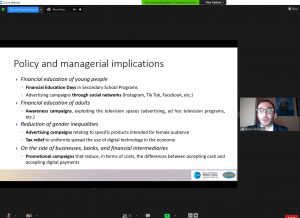 The first session addressed financial reform strategies for Med countries suffering from the consequences of the pandemic and from pre-existing international financial instability. It also focused on the role digitalization can play in the Med region, which is marked by a large divide between North and South and by sizeable gender differences in financial education. During this session, researchers emphasized on how strengthening the degree of Digital Financial Education of individuals can accelerate the digital transformation of firms during the pandemic. This can, in turn, contract the socio economic effects of the crisis in the southern Mediterranean, a region where cash is still very popular as a means of payment. (Marco Trinchera, access to the presentation and MedBrief no.5).
The first session addressed financial reform strategies for Med countries suffering from the consequences of the pandemic and from pre-existing international financial instability. It also focused on the role digitalization can play in the Med region, which is marked by a large divide between North and South and by sizeable gender differences in financial education. During this session, researchers emphasized on how strengthening the degree of Digital Financial Education of individuals can accelerate the digital transformation of firms during the pandemic. This can, in turn, contract the socio economic effects of the crisis in the southern Mediterranean, a region where cash is still very popular as a means of payment. (Marco Trinchera, access to the presentation and MedBrief no.5).
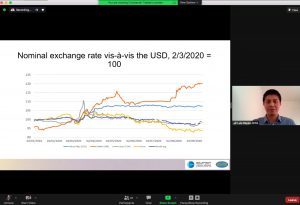 Furthermore, the second presentation provided a broad macro quantification of the implications of the pandemic on economic growth. The author outlined concrete suggestions to address the financial instability issues, which included the possibility of creating specific swap lines by the European Central Bank. The author argued how regional cooperation can prove to be particularly useful in preventing currency devaluation and suggested the creation of a Euro-Mediterranean rating agency which could take into account Environmental, Social, and Corporate Governance (ESG) criteria. With respect to the latter, the relationship between the Euro Med countries can be enhanced in a way that allows guiding investment to make it more resilient, both with respect to climate issues and with respect to dependency on traditional energy sources. The author also showed how fostering green investments, while respecting ESG criteria under the supervision of international organizations, would be beneficial for the region and could make Medcountries more financially resilient. (Luis Reyes, access to presentation and Medbrief no.3).
Furthermore, the second presentation provided a broad macro quantification of the implications of the pandemic on economic growth. The author outlined concrete suggestions to address the financial instability issues, which included the possibility of creating specific swap lines by the European Central Bank. The author argued how regional cooperation can prove to be particularly useful in preventing currency devaluation and suggested the creation of a Euro-Mediterranean rating agency which could take into account Environmental, Social, and Corporate Governance (ESG) criteria. With respect to the latter, the relationship between the Euro Med countries can be enhanced in a way that allows guiding investment to make it more resilient, both with respect to climate issues and with respect to dependency on traditional energy sources. The author also showed how fostering green investments, while respecting ESG criteria under the supervision of international organizations, would be beneficial for the region and could make Medcountries more financially resilient. (Luis Reyes, access to presentation and Medbrief no.3).
Transitioning to green investments and environmental issues, the following session revealed a potential paradigm for environmental policies in a post-Covid world.

The second session on the Environmental Policy Landscape Post-Covid showed that, in a region recognized as a climate change hot-spot and warming 20% faster than the global average, the Med countries ought to seize the opportunity created by the COVID crisis to build back better and to restart their economies in more efficient and environmental friendly manners. Indeed, the time has come for governments to encourage green technologies, develop the local economy, and to support environmentally-sensitive national producers, especially considering the slowdown in international trade. More generally, the core of public policy should rely on the concept of intergenerational justice; the authors’ closing argument was that, for the well-being of future generations, we shall not hold back on the fight against climate change as a pretext to overcome the COVID-19 crisis faster. (Vera Danilina, access to presentation and Medbrief no 8 ).
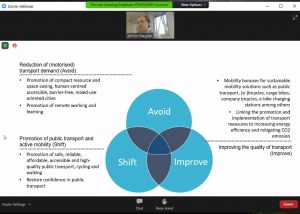 Accordingly, when thinking about our duties towards future generations, we need to acknowledge that the issue of transportation and mobility and responding to Covid-19 is related to the question of what the future of our cities should look like. This was the theme of the second presentation. In this context, an Avoid – shift – Improve paradigm (ASI) to mitigate the impact of the Covid in the transport sector was highlighted; first we need to start avoiding unnecessary travel or overdependency to travel. A second dimension would be to shift to clean and fast modes of transportation and finally we would need to improve quality and performance of transport. In fact, argued the authors of the brief, if we want to make use of the opportunities offered by this pandemic, we must also the promotion of compact and human-centered cities, without which we will not emerge stronger from this crisis. Indeed, environmental friendly policies should work better than in the past, as we are now more environmentally aware and we have a better understanding of the fact that environmental problems are imminent and not far-off. In other respects, the distributional impact of climate change policies and the implication in terms of inequalities should be taken into account in future research. .(Armin Wagner, access to presentation and Medbrief. No.2)
Accordingly, when thinking about our duties towards future generations, we need to acknowledge that the issue of transportation and mobility and responding to Covid-19 is related to the question of what the future of our cities should look like. This was the theme of the second presentation. In this context, an Avoid – shift – Improve paradigm (ASI) to mitigate the impact of the Covid in the transport sector was highlighted; first we need to start avoiding unnecessary travel or overdependency to travel. A second dimension would be to shift to clean and fast modes of transportation and finally we would need to improve quality and performance of transport. In fact, argued the authors of the brief, if we want to make use of the opportunities offered by this pandemic, we must also the promotion of compact and human-centered cities, without which we will not emerge stronger from this crisis. Indeed, environmental friendly policies should work better than in the past, as we are now more environmentally aware and we have a better understanding of the fact that environmental problems are imminent and not far-off. In other respects, the distributional impact of climate change policies and the implication in terms of inequalities should be taken into account in future research. .(Armin Wagner, access to presentation and Medbrief. No.2)
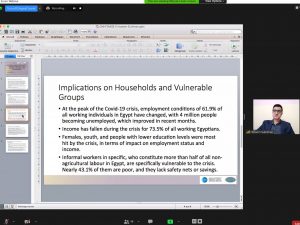 In the final Country-specific implications’ session, the cases of Egypt, Tunisia and Lebanon were presented, showing the importance of properly managing the crisis implications on households and on vulnerable groups, as well as the main economic challenges faced by these countries. A set of measures that should be implemented were also proposed for each country. With regards the first paper, it was stated that previous economic reforms in Egypt have relied on macroeconomic policies that included limited inclusive growth measures, and in response to the Covid Crisis the government prioritized businesses over households. Therefore, it is crucial for governments on the short run to increase cash transfers to the vulnerable and consider redistributing support from businesses to households, while on the long run, there should be a radical change in the government’s policy with increased focus on training and in preparing people for digital transformation (Hussein suleiman, access to presenation and Medbrief no. 4).
In the final Country-specific implications’ session, the cases of Egypt, Tunisia and Lebanon were presented, showing the importance of properly managing the crisis implications on households and on vulnerable groups, as well as the main economic challenges faced by these countries. A set of measures that should be implemented were also proposed for each country. With regards the first paper, it was stated that previous economic reforms in Egypt have relied on macroeconomic policies that included limited inclusive growth measures, and in response to the Covid Crisis the government prioritized businesses over households. Therefore, it is crucial for governments on the short run to increase cash transfers to the vulnerable and consider redistributing support from businesses to households, while on the long run, there should be a radical change in the government’s policy with increased focus on training and in preparing people for digital transformation (Hussein suleiman, access to presenation and Medbrief no. 4).
 For the Tunisian case, covered by the second paper, despite the government’s effort to reduce the impact of the crisis, the country still suffers from budgetary deficits. In addition, social measures were insufficient due to the lack of public finances and the measures taken to help households were deemed insufficient. Consequently, the government’s priority shall be to reach out to the vulnerable classes and provide additional efforts to get SMEs back on track (Hajer El ouardani, access to presentation and Medbrief No. 6).
For the Tunisian case, covered by the second paper, despite the government’s effort to reduce the impact of the crisis, the country still suffers from budgetary deficits. In addition, social measures were insufficient due to the lack of public finances and the measures taken to help households were deemed insufficient. Consequently, the government’s priority shall be to reach out to the vulnerable classes and provide additional efforts to get SMEs back on track (Hajer El ouardani, access to presentation and Medbrief No. 6).
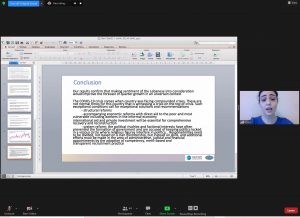
In Lebanon, finally, Covid has aggravated the pre-existing deep economic and financial crisis. The author showed that the economic sentiment of the population, as captured by the Google Trends platform, partly predicts the growth rates. This is explained by the fact that, in a situation of uncertainty, the anticipation of agents has a very important impact on economic activity. The search volume of crisis-related keywords can capture and represent a fearful attitude towards the economic situation (Jamal Bouoiyour, access to presentation and Medbrief no. 10).
In conclusion, it was clear that this crisis is representing a real test for the resilience of these economies. The way out of the crisis will depend on the capacity of governments to create innovative approaches to provide support packages to both households and businesses, all within their very limited resources.
.

During the closure of the Webinar it was emphasized that cooperation in the Mediterranean region will be a key factor for development in a post-Covid era.
Therefore, it was announced that FEMISE and CMI are launching a second Call for policy briefs (to access the call for round 2 with deadline 29 january 2021- click here) and will encourage briefs that apply this cooperation dimension. Competition will be open to all researchers and without excluding other themes, some examples of topics of preference are :
- Post-Covid reforms and strategies to accelerate a clean energy future in the Mediterranean
- The potential of Social Entrepreneurship for growth and jobs post-Covid
- How to capitalize on the EU-Mediterranean-Africa cooperation axis
- Partnerships to develop better regional responses to COVID challenges
- Regional strategies for attracting FDI at time of crisis
- Skills to strengthen post-COVID and strategies to develop them
- Preparing the youth for a post-COVID era avoiding unemployment (e-learning, digital skills, etc.)
- Reducing gender inequality and unemployment among women that were hit the hardest with the COVID.
More information on how to submit the policy papers and the General Guidelines for the “COVID-19 MED BRIEFS” can be found here .

